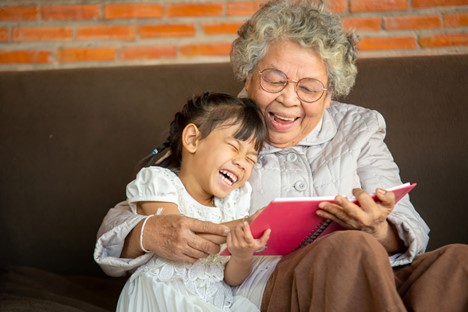Kinship Care

Kinship care in the foster care system refers to the care of children by relatives and is also referred to as formal kinship care. In California’s foster care system, kinship care also includes nonrelative extended family members (NREFMs), often referred to as “fictive kin.” Relatives are the preferred resource for children who are unable to reside with their birth parents because it maintains the children's connections with their families.
A "relative" means an adult who is related to the child by blood, adoption, or affinity within the fifth degree of kinship, including stepparents, stepsiblings, and all relatives whose status is preceded by the words "great," "great-great," or "grand," or the spouse of any of these persons, even if the marriage was terminated by death or dissolution.
In California, a relative could also be a "nonrelative extended family member" (NREFM), which is defined as an adult caregiver who has an established familial relationship with a relative of the child or a familial or mentoring relationship with the child. The county welfare department verifies the existence of a relationship through interviews with the parent and child or with one or more third parties. The parties may include relatives of the child, teachers, medical professionals, clergy, neighbors, and family friends.
Placement with Relatives

If a child is removed from the care of his or her parent(s), the social worker must conduct, within 30 days, an investigation to identify and locate all grandparents, parents of a sibling of the child (if the parent has legal custody of the sibling), adult siblings, and other adult relatives of the child, including any other adult relatives suggested by the parents. Counties must provide all identified relatives with written and oral notification unless notification is inappropriate due to the relative’s history of family or domestic violence.
In any case in which a child is removed from the physical custody of his or her parents, preferential consideration is required to be given to a request by a relative of the child for placement of the child with the relative, regardless of the relative’s immigration status (W&IC 361.3).
Resources and Information
A Resource Parent Guide (Español) has been developed by the California Department of Social Services (CDSS) in partnership with California Alliance of Caregivers (CAC) to assist you with meeting the needs of the children and youth living in your home.
The Caregiver Support Webinar Series consists live and recorded webinars provided by The California Department of Social Services (CDSS) and the California Alliance of Caregivers (CAC) on topics that have been requested by caregivers. These webinars provide information about the laws and policies that affect caregivers and their foster/kinship children, as well as providing popular resources and information and include discussions from speakers and panels with lived experience. Please follow this link to view a past episode in the series.
Family Urgent Response System (FURS) is a Free 24/7/365 Hotline with a coordinated statewide, regional, and county-level system that delivers effective trauma-informed supports for all current and former foster youth and their caregivers. Through phone-based response and county-level in-home, in-person mobile response during situations of instability, FURS preserves the relationship of the caregiver and the child or youth. For Immediate assistance please see the FURS 24/7/35 hotline link. For additional information please email: FURS@dss.ca.gov.
You may also refer to the Kinship Support Resources webpage for information on available supports and resources within county. These resources also provide various types of non-financial support to those relative caregivers and children who are not dependents of the juvenile court (e.g., not in foster care), also referred to as “informal kinship care.” Informal relative caregivers can also refer to the CalWORKs site for more information on financial assistance through CalWORKs payments (TANF) as a non-needy relative. Relatives may be able to apply online at Benefitscal.org or contact the social services agency within their county.
California Kinship Navigator (CKN) is a free service for kinship caregivers and current and former foster youth brought to you by the California Department of Social Services (CDSS) in partnership with Think of Us (TOU). CKN supports kinship caregivers and current or former foster youth to quickly find and access resources by connecting with a team of Community Responders who take the labor-intensive work off the families. These services are available in English and Spanish through a combination of options. These options include direct support from a community responder (via email, text, or telephone), or navigating resources with individualized recommendations. To access resources in your local area, please visit the California Kinship Navigator website. Please see the California Kinship Navigator flyer.
For Frequently Asked Questions regarding Kin-GAP, please see the Kin-GAP frequently asked questions or to visit our Resource Page website.
All County Letters (ACLs) and Other Notices
- Caregiver Support – California Kinship Navigator
- Caregiver Resources - ACIN I-46-22
- Flexible Family Supports and Home-Based Foster Care Funding – ACL 23-02
- Foster Parent Recruitment, Retention and Support (FPRRS) Funding – W&IC 16003.5; ACL 20-11, ACL 17-90, ACL 16-52, ACL 16-52E, ACL 15-88, ACL 15-76, ACIN I-77-19, ACIN I-53- 17, ACIN I-94-15; FPRRS website
- Kinship Guardianship Assistance Payment (Kin-GAP) Program – W&IC 11360- 11379, W&IC 11385-11393; ACL 11-67, ACL 14-19, ACL 11-15, ACL 11-15E, ACL 11- 15EII; MPP 45- 600; Assembly Bill (AB) 12 (Chapter 559, Statutes of 2010)
- Alternate Guardian/Co-guardian – W&IC 11363(e)
- Extended Kin-GAP – W&IC 11386; ACL 11-86
- Fictive Kin for Kin-GAP – W&IC 11391; ACL 14-28; AB 1712 (Chapter 846, Statutes of 2012)
- Successor Guardian – W&IC 11386(i), W&IC 11391(c); ACL 15-66
- Nonrelated Legal Guardian (NRLG)/Extended NRLG – W&IC 11405; ACL 12-48, ACL 12- 48E, ACL 11-69, ACL 11-09, ACIN I-76-15, ACIN I-76-15E, ACIN I-29-13
- Reasonable and Prudent Parent Standard/QPI – W&IC 362.04, W&IC 362.05; 16519.5(g)(13)(M); ACL 16-31, ACIN I-28-15, ACIN I-17-13
- Tribal Policy (Tribally Approved Homes, Tribal Background Checks) – W&IC 16504.6, W&IC 10553.12, W&IC 10553.13, PC 11105.08; ACL 19-71, ACL 17-62, ACIN I-05-20; SB 1460; (Chapter 772, Statutes of 2014); Tribally Approved Homes (TAHs) Frequently Asked Questions (FAQs); Tribal Background Check Information and Resources website
- ICWA Resources – Office of Tribal Affairs (OTA) website
For Additional Information:
Foster Caregiver Policy and Support Unit
744 P Street, MS 8-13-78
Sacramento, CA 95814
(916) 651-7465
CaregiversForYouth@dss.ca.gov